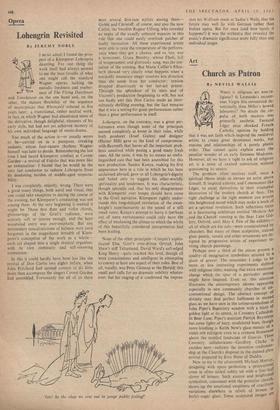Opera
Lohengrin Revisited
By JEREMY NOBLE
Too much of the action is—or usually seems to be—carried on in a pompous, creaking andante, whose four-square rhythms Wagner himself was later to deride. Remembering the last time I had heard Klemperer conduct at Covent Garden—a revival of Fidelio that was more like an exhumation—I feared that he would be the very last conductor to redeem Lohengrin from its deadening burden of middle-aged respecta- bility.
I was completely, abjectly, wrong. There were a good many things, both aural and visual, that one could take exception to during the course of the evening, but Klemperer's conducting was not among them. At the very beginning it seemed it might be. Those first flute and violin chords, glimmerings of the Grail's radiance, were scarcely soft or remote enough, and the later woodwind entry was over-emphatic. But any momentary miscalculations of balance were soon forgotten in the magnificent breadth of Klem- perer's conception of the work as a whole— each act shaped into a single musical organism, with its own continuity and self-renewing momentum.
In this it could hardly have been less like the revival of Don Carlos two nights before, when John Pritchard had seemed content to do little more than accompany the singers Covent Garden had assembled. Fortunately for all of us there
were several first-rate stylists among them- Gobbi and Christoff, of course, and also the new Carlos, the Swedish Ragnar Ulfung, who revealed so many of the usually unheard nuances in this role that one could easily overlook patches of faulty intonation. All these experienced artists were able to raise the temperature of the perform- ance when they got a chance, and so, too, was a newcomer, Grace Bumbry, whose Eboli, full of temperament and gloriously sung, was the sen- sation of the evening. But Marie Collier's Eliza- be:h showed very clearly what happens when a
musically immature singer receives less direction than she needs from her conductor: tension dropped disastrously in her last-act prayer.
Through the splendour of its stars and of Visconti's production (beginning to wilt, but not too badly yet) this Don Carlos made an inter- mittently thrilling evening, but the fact remains that it was a setting for great performances rather than a great performance in itself.
Lohengrin, on the contrary, was a great per- formance even though none of the principals seemed completely at home in their roles, while both producer (Josef Gielen) and designer (Hainer Hill) gave us the kind of compromise- with-Bayreuth that leaves all the important prob- lems unsolved while posing a good many fresh ones. All the same, it was by no means an undis- tinguished cast that had been assembled for this new production. Sandor Konya, making his first appearance here in a role in which he has been acclaimed abroad, gave us all Lohengrin's dignity and failed only to suggest his other-worldly spirituality and tenderness. It was characteristic, though specially sad, that his only disagreement with Klemperer over tempo should have come in the Grail narrative. Klemperer rightly under- stands this long-delayed revelation of the swan- knight's superhumanity as the sound of a still small voice; Konya's attempt to hurry it (perhaps out of mere nervousness) could only have the effect of weakening the climax to which the whole of this beautifully considered interpretation had been leading.
None of the other principals—Crespin's sophis- ticated Elsa, Gorr's over-driven Ortrud, John Shaw's stiff Telramund, David Ward's soft-edged King Henry—quite reached this level, though all were conscientious and intelligent in attempting to convey at least one aspect of their roles. Best of all, vocally, was Peter Glossop as the Herald; this small part calls for no dramatic subtlety whatso- ever, but his singing of it confirmed the impres- 'Isn't he the chap we sent out to gauge public feeling?'
sion his Wolfram made at Sadler's Wells, that his future may well lie with German rather than Italian opera. But for once (and how rarely it happens!) it was the orchestra that revealed the music's dramatic significance more fully than any individual singer.


































 Previous page
Previous page